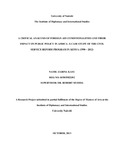| dc.contributor.author | Kasu, Zarina | |
| dc.date.accessioned | 2013-11-12T08:18:41Z | |
| dc.date.available | 2013-11-12T08:18:41Z | |
| dc.date.issued | 2013-10 | |
| dc.identifier.citation | Degree of Masters of Arts | en |
| dc.identifier.uri | http://erepository.uonbi.ac.ke:8080/xmlui/handle/123456789/58625 | |
| dc.description | A Research Project submitted in partial fulfilment of the Degree of Masters of Arts at the
Institute of Diplomacy and International Studies | en |
| dc.description.abstract | This study explores the impact of foreign aid conditionalties on public policy in Africa. It argues
that donor countries should reduce conditionalities and strengthen domestic accountability. It
reveals that when donors impose conditions as a pre-requisite for disbursement of aid, recipient
countries end up adopting these conditions as ‘public policies’ without domestic participation
and proper planning to the detriment of its citizens. However this study acknowledges that
although consequences of donor conditionalities adversely affected the recipient countries, in the
long term some of the SAPs actually benefited these countries such as the liberation of money
markets and other aspects that spurred economic growth.
The study concludes that poverty amongst Kenyans was actually abated instead of
beingalleviated as a result of retrenchment of civil servants on an ad hoc basis in the
implementation of Civil Service Reforms Programme (CSRP) in Kenya. This brought to the fore
the glaring gap of lack of policy coordination in the government. Whereas on one hand the
government was advocating for poverty reduction, on the other hand she was retrenching civil
servants without properly cushioning them against harsh economic realities. The savings made
from the retrenchment were used to pay better salaries to a lean, efficient and effective civil
service while the retrenches/retirees could hardly make ends meet.
The study recommends recipient countries to formulate home-grown policies backed by policy
research conducted by Think-Tanks, to enhance ownership and strengthen partnership on
conditionality. These Think- Tanks should be assimilated into the process of public policy
making to coordinate the various initiatives that have similar goals.
This study further concludes thatreduction of the public service wage-bill (by retrenchment and
retirement of public servants) is not a solution towards reducing a country’s current account
deficit. Other factors like the real peculiarities of African economies need to be looked into, with
a view of establishing how they contribute towards slow growth of an economy and how they
can be mitigated. In Kenya, the post –election violence in 2008 and the constant wrangling of the
coalition government immensely affected the country’s economic growth. The gains made by
Economic Recovery Strategy which realised an economic growth of 7% in2006 and a decline in
poverty levels from 56.8% to 46% were greatly eroded. The economy grew by only 2.3% in
2008 instead of the projected 7%. This study also concludes that as the Western donors continue
to impose harsh conditionalities,African countries are increasingly ‘facing the East’. China is
making tremendous inroads into African economies. The question begs- is this yet another
scramble for Africa or is the cold war resurrecting in another form? | en |
| dc.language.iso | en | en |
| dc.publisher | University of Nairobi | en |
| dc.title | A Critical Analysis of Foreign Aid Conditionalities and Their Impact on Public Policy in Africa: a Case Study of the Civil Service Reform Program in Kenya (1990 – 2012) | en |
| dc.type | Thesis | en |
| local.publisher | Institute of Diplomacy and International Studies | en |

